CITROEN C4 2018 Owners Manual
Manufacturer: CITROEN, Model Year: 2018, Model line: C4, Model: CITROEN C4 2018Pages: 317, PDF Size: 9.31 MB
Page 191 of 317
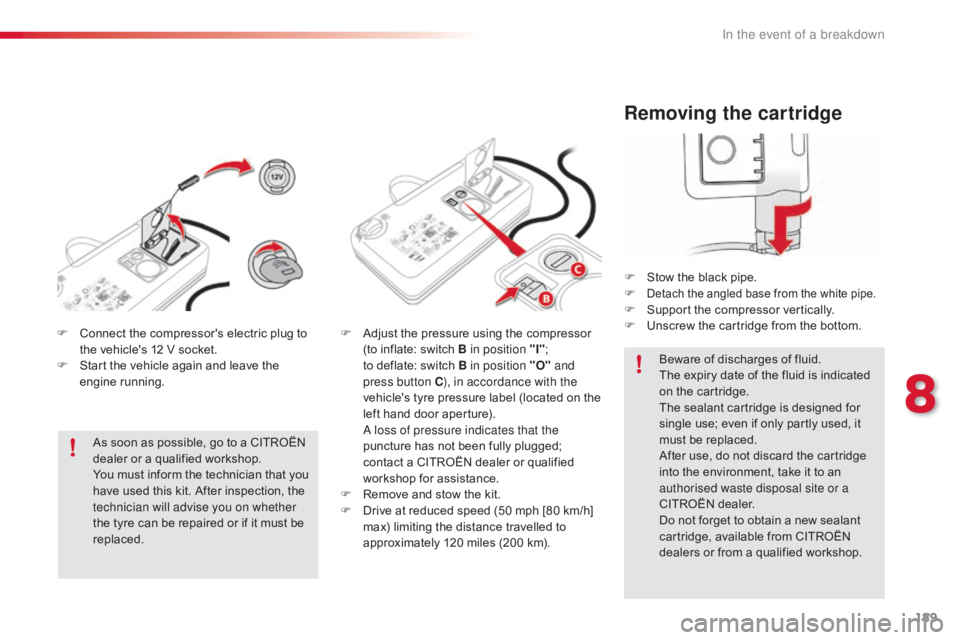
189
C4-cactus_en_Chap08_En-cas-de-panne_ed01-2016
Removing the cartridge
Fô Stowô the ô black ô pipe.
F Detachô theô angledô baseô fromô theô whiteô pipe.Fô Support ô the ô compressor ô vertically.
F ô U nscrew ô the ô cartridge ô from ô the ô bottom.
Beware
ô of ô discharges ô of ô fluid.
The
ô expiry ô date ô of ô the ô fluid ô is ô indicated ô
o
n ô the ô cartridge.
The
ô sealant ô cartridge ô is ô designed ô for ô
s
ingle ô use; ô even ô if ô only ô partly ô used, ô it ô
m
ust ô be ô replaced.
After
ô use, ô do ô not ô discard ô the ô cartridge ô
i
nto ô the ô environment, ô take ô it ô to ô an ô
a
uthorised waste disposal site or a
CITROûN
ô dealer.
Do
ô not ô forget ô to ô obtain ô a ô new ô sealant ô
c
artridge, ô available ô from ô CITROûN ô
d
ealers ô or ô from ô a ô qualified ô workshop.
F
ô
C
onnect
ô
the
ô
compressor's
ô
electric
ô
plug
ô
to
ô
t
he
ô
vehicle's
ô
12
ô
V
ô
socket.
F
ô
S
tart
ô
the
ô
vehicle
ô
again
ô
and
ô
leave
ô
the
ô
e
ngine
ô r
unning.
As
ô
soon
ô
as
ô
possible,
ô
go
ô
to
ô
a
ô
CITROûN
ô
d
ealer
ô
or
ô
a
ô
qualified
ô
workshop.
You
ô
must
ô
inform
ô
the
ô
technician
ô
that
ô
you
ô
h
ave
ô
used
ô
this
ô
kit.
ô
After
ô
inspection,
ô
the
ô
t
echnician will advise you on whether
the
ô
tyre
ô
can
ô
be
ô
repaired
ô
or
ô
if
ô
it
ô
must
ô
be
ô
r
eplaced. F
ô
A
djust
ô
the
ô
pressure
ô
using
ô
the
ô
compressor
ô
(
to
ô
inflate:
ô
switch
ô
B in position "I" ;
ô
t
oô deflate:
ô
switch
ô
B
in position "O" and
press button C ), in accordance with the
vehicle's
ô
t
yre
ô
pressure
ô
label
ô
(located
ô
on
ô
the
ô
l
eft
ô
hand
ô
door
ô
aperture).
ô
A l
oss of pressure indicates that the
puncture
ô
has
ô
not
ô
been
ô
fully
ô
plugged;
ô
c
ontact
ô
a
ô
CITROûN
ô
dealer
ô
or
ô
qualified
ô
w
orkshop
ô
for
ô
assistance.
F
ô
R
emove
ô
and
ô
stow
ô
the
ô
kit.
F
ô
D
rive
ô
at
ô
reduced
ô
speed
ô
(50
ô
mph
ô
[80
ô
km/h]
ô
m
ax)
ô
limiting
ô
the
ô
distance
ô
travelled
ô
to
ô
a
pproximately
ô
120
ô
miles
ô
(200
ô
km).
8
In the event of a breakdown
Page 192 of 317
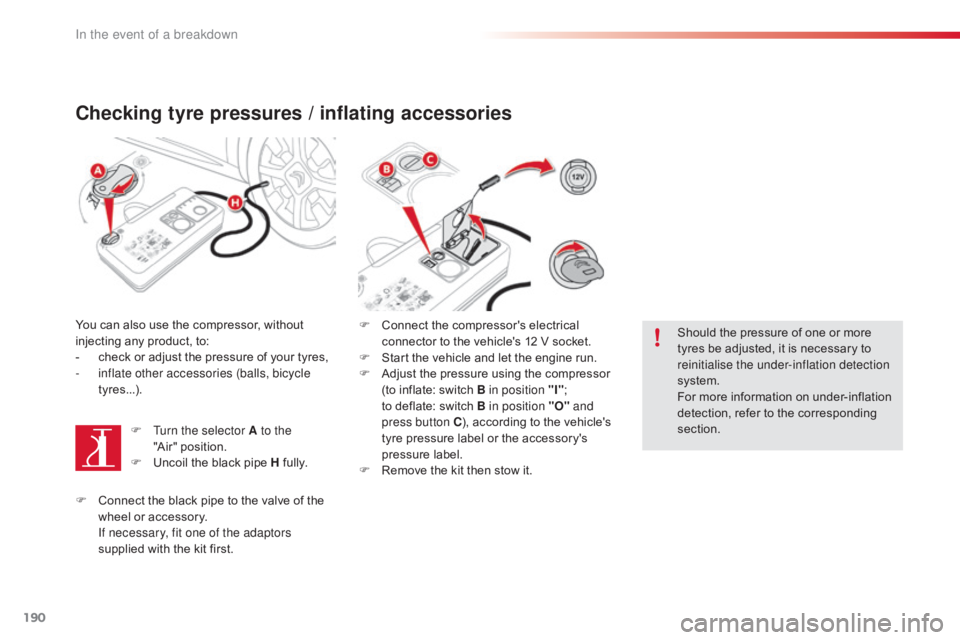
190
C4-cactus_en_Chap08_En-cas-de-panne_ed01-2016
Checking tyre pressures / inflating accessories
Youô canô alsoô useô theô compressor,ô withoutô injecting ô any ô product, ô to:
-
ô
c
heck ô or ô adjust ô the ô pressure ô of ô your ô tyres,
-
i
nflate other accessories (balls, bicycle
tyres...).
F
T
urn the selector A to the
"Air"ô position.
F
ô
U
ncoil ô the ô black ô pipe ô H ô
f
ully.F
ô C onnect ô the ô compressor's ô electrical ô
c
onnector ô to ô the ô vehicle's ô 12 ô V ô socket.
F
ô
S
tart ô the ô vehicle ô and ô let ô the ô engine ô run.
F
ô
A
djust ô the ô pressure ô using ô the ô compressor ô
(
to ô inflate: ô switch ô B in position "I";
ô
t
oô deflate: ô switch ô B in position "O" and
press button C ),
ô according ô to ô the ô vehicle's ô
t
yre ô pressure ô label ô or ô the ô accessory's ô
p
ressure ô label.
F
ô
R
emove ô the ô kit ô then ô stow ô it.Should
ô the ô pressure ô of ô one ô or ô more ô
t
yres ô be ô adjusted, ô it ô is ô necessary ô to ô
r
einitialise the under-inflation detection
system.
For
ô more ô information ô on ô under-inflation ô
d
etection, ô refer ô to ô the ô corresponding ô
s
ection.
F
ô
C
onnect ô the ô black ô pipe ô to ô the ô valve ô of ô the ô
w
heel ô or ô accessory.
I
f necessary, fit one of the adaptors
supplied
ô with ô the ô kit ô first.
In the event of a breakdown
Page 193 of 317
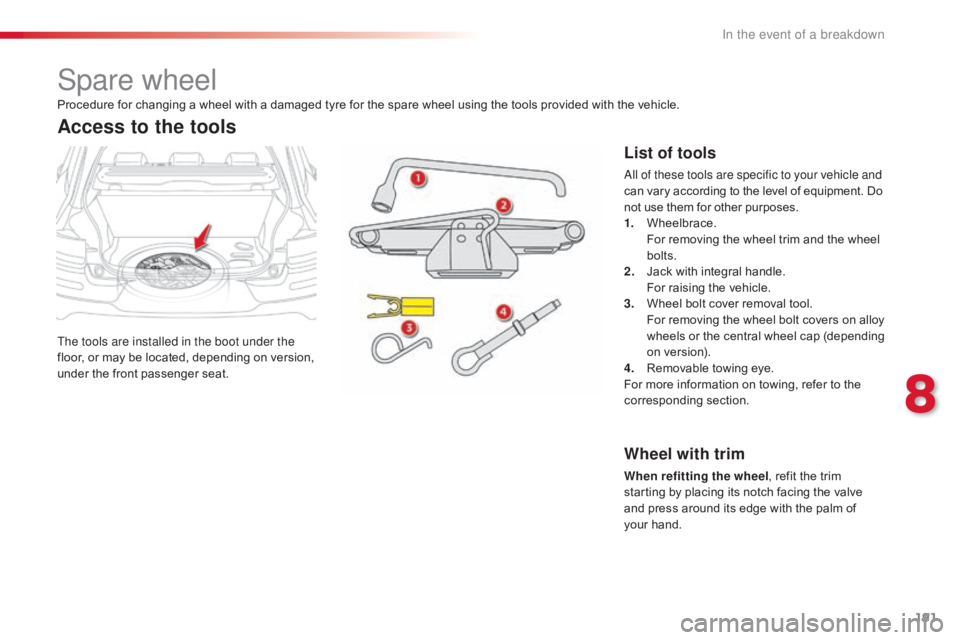
191
C4-cactus_en_Chap08_En-cas-de-panne_ed01-2016
Spare wheel
The tools are installed in the boot under the
floor,ô or ô may ô be ô located, ô depending ô on ô version, ô
u
nder
ô t
he
ô f
ront
ô p
assenger
ô sea
t.
Access to the tools
List of tools
All of these tools are specific to your vehicle and
canô vary ô according ô to ô the ô level ô of ô equipment. ô Doô n
ot ô use ô them ô for ô other ô purposes.
1.
ô W
heelbrace.
ô F
or ô removing ô the ô wheel ô trim ô and ô the ô wheel ô
bol
ts.
2.
ô J
ack ô with ô integral ô handle.
ô F
or ô raising ô the ô vehicle.
3.
ô W
heel ô bolt ô cover ô removal ô tool.
ô F
or ô removing ô the ô wheel ô bolt ô covers ô on ô alloy ô
w
heels
ô o
r
ô t
he
ô c
entral
ô w
heel
ô c
ap
ô (
depending
ô o
n ô version).
4.
ô R
emovable ô towing ô eye.
For
ô more ô information ô on ô towing, ô refer ô to ô the ô
c
orresponding
ô s
ection.
Procedure
ô
for
ô
changing
ô
a
ô
wheel
ô
with
ô
a
ô
damaged
ô
tyre
ô
for
ô
the
ô
spare
ô
wheel
ô
using
ô
the
ô
tools
ô
provided
ô
with
ô
the ô vehicle.
Wheel with trim
When refitting the wheel
, ô refit ô the ô trim ô s
tarting ô by ô placing ô its ô notch ô facing ô the ô valve ô
a
nd ô press ô around ô its ô edge ô with ô the ô palm ô of ô
y
ourô hand.
8
In the event of a breakdown
Page 194 of 317
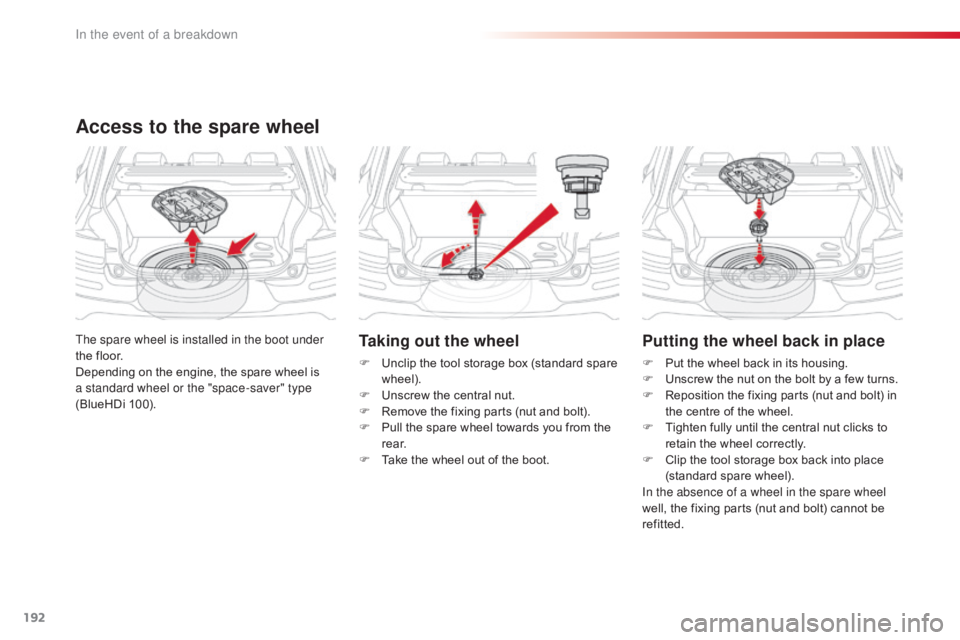
192
C4-cactus_en_Chap08_En-cas-de-panne_ed01-2016
Taking out the wheel
Fô Unclipô the ô tool ô storage ô box ô (standard ô spare ô w
heel).
F
ô
U
nscrew ô the ô central ô nut.
F
ô
R
emove ô the ô fixing ô parts ô (nut ô and ô bolt).
F
ô
P
ull ô the ô spare ô wheel ô towards ô you ô from ô the ô
r
e a r.
F
ô
T
ake ô the ô wheel ô out ô of ô the ô boot.
The spare wheel is installed in the boot under
the
ô
floor.
Depending
ô
on
ô
the
ô
engine,
ô
the
ô
spare
ô
wheel
ô
is
ô
a s
tandard wheel or the "space-saver" type
(BlueHDi
ô
100).
Access to the spare wheel
Putting the wheel back in place
Fô Put ô the ô wheel ô back ô in ô its ô housing.
F ô U nscrew ô the ô nut ô on ô the ô bolt ô by ô a ô few ô turns.
F
ô
R
eposition ô the ô fixing ô parts ô (nut ô and ô bolt) ô in ô
t
he ô centre ô of ô the ô wheel.
F
ô
T
ighten ô fully ô until ô the ô central ô nut ô clicks ô to ô
r
etain ô the ô wheel ô correctly.
F
ô
C
lip ô the ô tool ô storage ô box ô back ô into ô place ô
(
standard
ô spar
e
ô w
heel).
In the absence of a wheel in the spare wheel
well,
ô the ô fixing ô parts ô (nut ô and ô bolt) ô cannot ô be ô
r
efitted.
In the event of a breakdown
Page 195 of 317
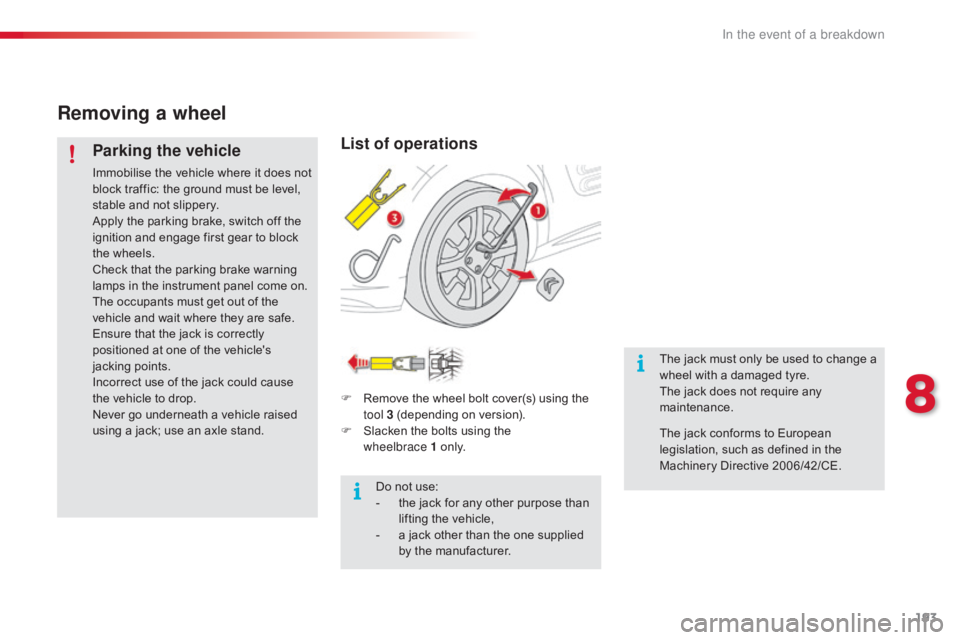
193
C4-cactus_en_Chap08_En-cas-de-panne_ed01-2016
Removing a wheel
Parking the vehicle
Immobiliseô theô vehicleô whereô itô doesô notô block ô traffic: ô the ô ground ô must ô be ô level, ô
s
table ô and ô not ô slippery.
Apply
ô the ô parking ô brake, ô switch ô off ô the ô
i
gnition ô and ô engage ô first ô gear ô to ô block ô
t
he ô wheels.
Check
ô that ô the ô parking ô brake ô warning ô
l
amps ô in ô the ô instrument ô panel ô come ô on.
The
ô occupants ô must ô get ô out ô of ô the ô
v
ehicle ô and ô wait ô where ô they ô are ô safe.
Ensure
ô that ô the ô jack ô is ô correctly ô
p
ositioned ô at ô one ô of ô the ô vehicle's ô
j
acking ô points.
Incorrect
ô use ô of ô the ô jack ô could ô cause ô
t
he ô vehicle ô to ô drop.
Never
ô go ô underneath ô a ô vehicle ô raised ô
u
sing ô a ô jack; ô use ô an ô axle ô stand.
List of operations
Fô Removeô the ô wheel ô bolt ô cover(s) ô using ô the ô t
ool 3 ô (depending ô on ô version).
F
ô
S
lacken ô the ô bolts ô using ô the ô
w
heelbrace
1ô o n l y.
Do
ô not ô use:
-
ô
t
he ô jack ô for ô any ô other ô purpose ô than ô
l
ifting ô the ô vehicle,
-
ô
a
ô jack ô other ô than ô the ô one ô supplied ô
b
y ô the ô manufacturer. The
ô jack ô must ô only ô be ô used ô to ô change ô a ô
w
heel ô with ô a ô damaged ô tyre.
The ô jack ô does ô not ô require ô any ô m
aintenance.
The
ô jack ô conforms ô to ô European ô
l
egislation, ô such ô as ô defined ô in ô the ô
M
achinery ô Directive ô 2006/42/CE.
8
In the event of a breakdown
Page 196 of 317
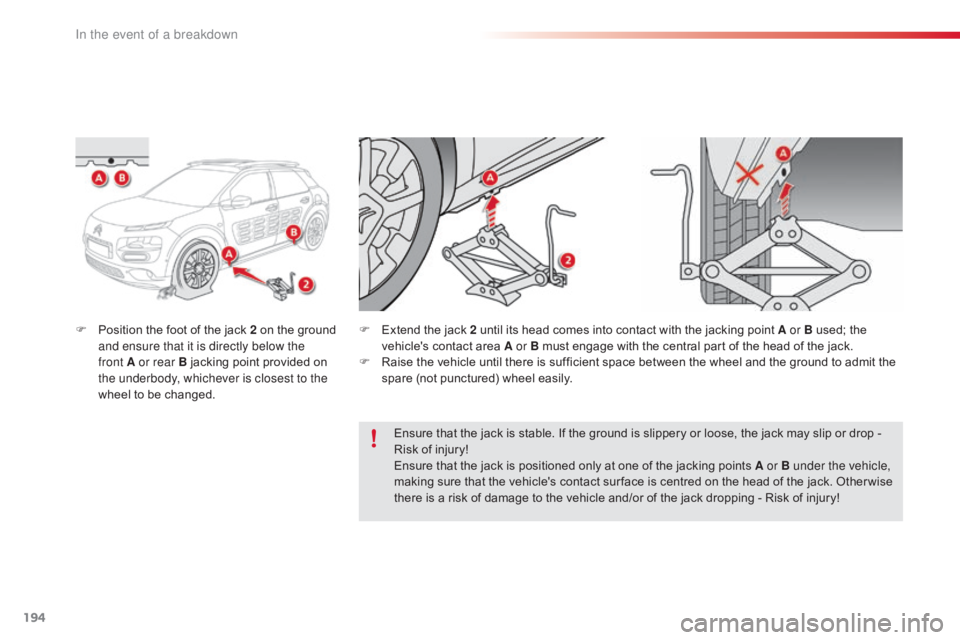
194
C4-cactus_en_Chap08_En-cas-de-panne_ed01-2016
Fô Positionô the ô foot ô of ô the ô jack ô 2 ô on ô the ô ground ô a
nd ensure that it is directly below the
front
A or rear B ô jacking ô point ô provided ô on ô
t
he underbody, whichever is closest to the
wheel
ô to ô be ô changed. F
ô E xtend ô the ô jack ô 2 ô until ô its ô head ô comes ô into ô contact ô with ô the ô jacking ô point ô A or B ô used; ô the ô v
ehicle's ô contact ô area ô A or B ô must ô engage ô with ô the ô central ô part ô of ô the ô head ô of ô the ô jack.
F
ô
R
aise ô the ô vehicle ô until ô there ô is ô sufficient ô space ô between ô the ô wheel ô and ô the ô ground ô to ô admit ô the ô
s
pare ô (not ô punctured) ô wheel ô easily.
Ensure
ô that ô the ô jack ô is ô stable. ô If ô the ô ground ô is ô slippery ô or ô loose, ô the ô jack ô may ô slip ô or ô drop ô - ô
R
isk ô of ô injury!
Ensure
ô that ô the ô jack ô is ô positioned ô only ô at ô one ô of ô the ô jacking ô points ô A or B under the vehicle,
making
ô sure ô that ô the ô vehicle's ô contact ô sur face ô is ô centred ô on ô the ô head ô of ô the ô jack. ô Other wise ô
t
here ô is ô a ô risk ô of ô damage ô to ô the ô vehicle ô and/or ô of ô the ô jack ô dropping ô - ô Risk ô of ô injury!
In the event of a breakdown
Page 197 of 317
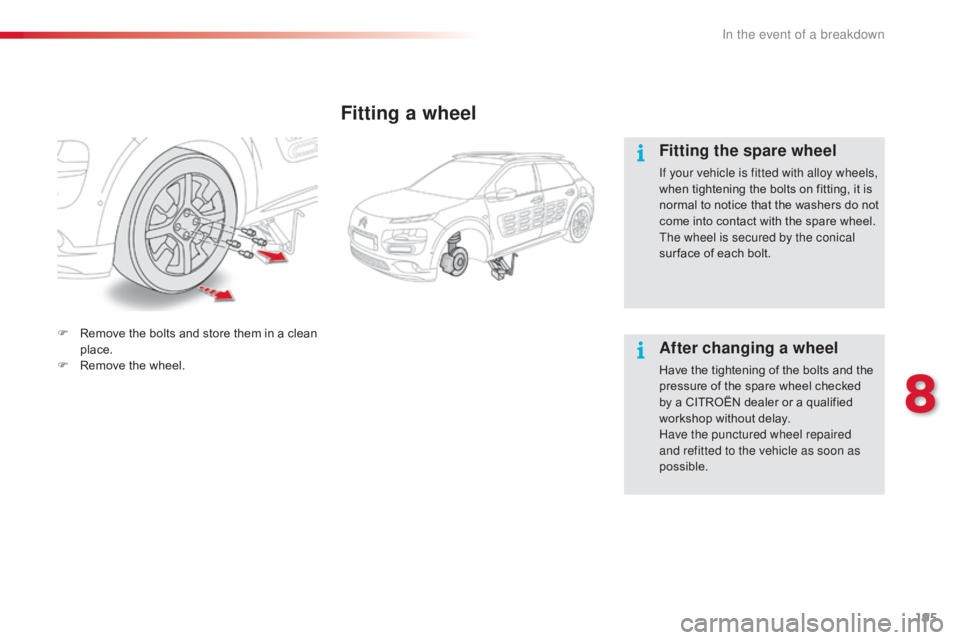
195
C4-cactus_en_Chap08_En-cas-de-panne_ed01-2016
Fitting a wheel
Fitting the spare wheel
If your vehicle is fitted with alloy wheels,
whenô tightening ô the ô bolts ô on ô fitting, ô it ô is ô
n
ormal ô
t
o ô
n
otice ô
t
hat ô
t
he ô
w
ashers ô
d
o ô
n
ot ô
c
ome ô into ô contact ô with ô the ô spare ô wheel. ô
T
he wheel is secured by the conical
sur face
ô of ô each ô bolt.
After changing a wheel
Haveô theô tighteningô ofô theô boltsô andô theô pressure ô of ô the ô spare ô wheel ô checked ô
b
y ô a ô CITROûN ô dealer ô or ô a ô qualified ô
w
orkshop ô without ô delay.
Have the punctured wheel repaired
and refitted to the vehicle as soon as
possible.
F
ô
R
emove
ô
the
ô
bolts
ô
and
ô
store
ô
them
ô
in
ô
a
ô
clean
ô
p
lace.
F
ô R
emove
ô
the
ô
wheel.
8
In the event of a breakdown
Page 198 of 317
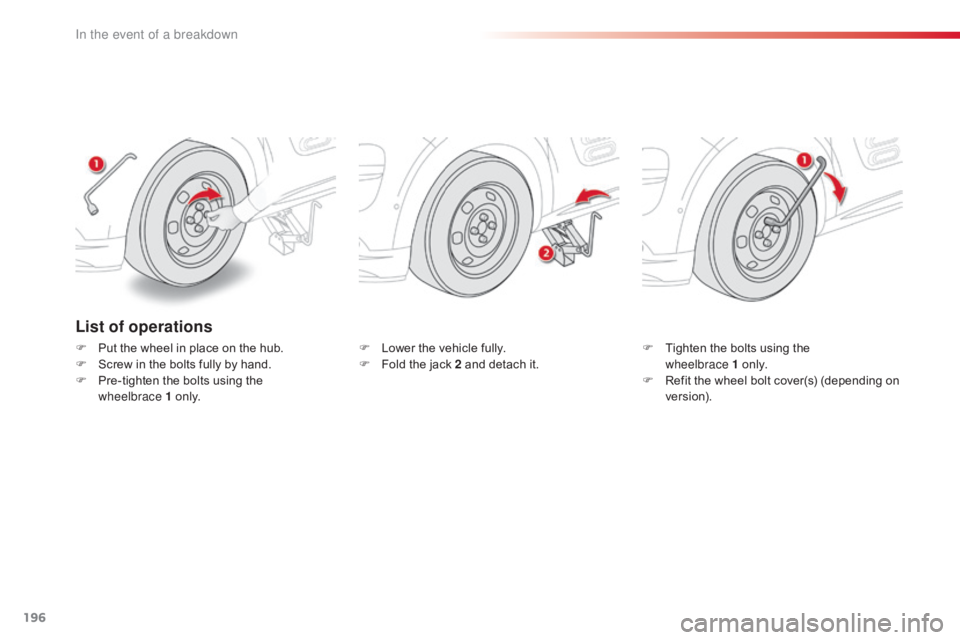
196
C4-cactus_en_Chap08_En-cas-de-panne_ed01-2016
List of operations
Fô Putô the ô wheel ô in ô place ô on ô the ô hub.
F ô S crew ô in ô the ô bolts ô fully ô by ô hand.
F
ô
P
re-tighten ô the ô bolts ô using ô the ô
w
heelbrace
1 ô
o
n l y. F
ô L ower ô the ô vehicle ô fully.
F ô F old ô the ô jack ô 2 ô and ô detach ô it.F
ô T ighten ô the ô bolts ô using ô the ô w
heelbrace 1ô o n l y.
F
ô
R
efit ô the ô wheel ô bolt ô cover(s) ô (depending ô on ô
v
e r s i o n).
In the event of a breakdown
Page 199 of 317
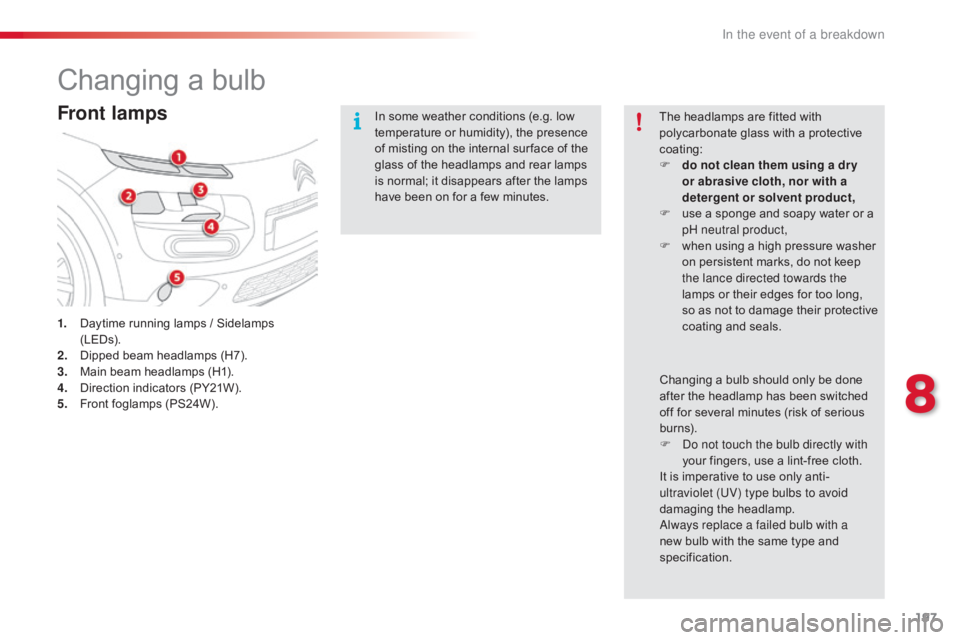
197
C4-cactus_en_Chap08_En-cas-de-panne_ed01-2016
Changingô aô bulb
Front lamps
1.ô Daytimeô running ô lamps ô / ô Sidelamps ô (LE
Ds).
2.
ô D
ipped ô beam ô headlamps ô (H7).
3.
ô M
ain ô beam ô headlamps ô (H1).
4.
ô D
irection ô indicators ô (PY21W).
5.
ô F
ront ô foglamps ô (PS24W). In
ô some ô weather ô conditions ô (e.g. ô low ô
t
emperature ô or ô humidity), ô the ô presence ô
o
f ô misting ô on ô the ô internal ô sur face ô of ô the ô
g
lass ô of ô the ô headlamps ô and ô rear ô lamps ô
i
s ô normal; ô it ô disappears ô after ô the ô lamps ô
h
ave ô been ô on ô for ô a ô few ô minutes.
The ô headlamps ô are ô fitted ô with ô
p
olycarbonate ô glass ô with ô a ô protective ô
c
oating:
F
d
o not clean them using a dr y
or abrasive cloth, nor with a
detergent or solvent product,
F ô
u
se ô a ô sponge ô and ô soapy ô water ô or ô a ô
p
H neutral product,
F ô
w
hen ô using ô a ô high ô pressure ô washer ô
o
n ô persistent ô marks, ô do ô not ô keep ô
t
he lance directed towards the
lamps ô or ô their ô edges ô for ô too ô long, ô s
o ô as ô not ô to ô damage ô their ô protective ô c
oatingô a ndô sea ls.
Changing
ô a ô bulb ô should ô only ô be ô done ô
a
fter ô the ô headlamp ô has ô been ô switched ô
o
ff ô for ô several ô minutes ô (risk ô of ô serious ô
b
urns).
F
D
o not touch the bulb directly with
your
ô fingers, ô use ô a ô lint-free ô cloth.
It
ô is ô imperative ô to ô use ô only ô anti-
ultraviolet (UV) type bulbs to avoid
damaging
ô t
he
ô h
eadlamp.
Always replace a failed bulb with a
new
ô bulb ô with ô the ô same ô type ô and ô
s
pecification.
8
In the event of a breakdown
Page 200 of 317
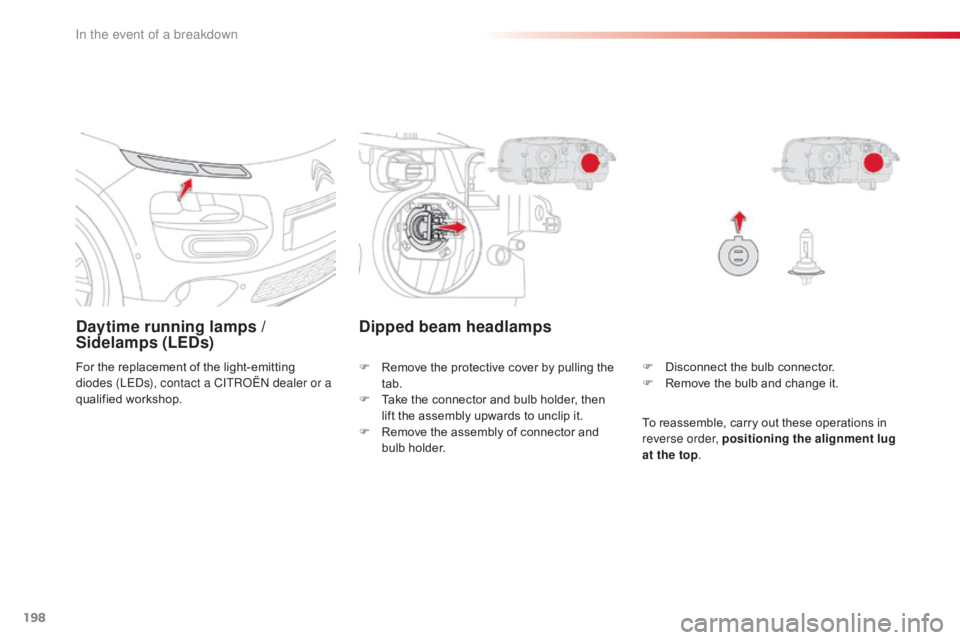
198
C4-cactus_en_Chap08_En-cas-de-panne_ed01-2016
Daytime running lamps /
S idelamps (LEDs)
Forô theô replacementô ofô theô light-emittingô d
iodes (LEDs), contact a CITROûN dealer or a
qualified
ô w
orkshop. F
ô D isconnect ô the ô bulb ô connector.
F
ô
R
emove ô the ô bulb ô and ô change ô it.
Dipped beam headlamps
Fô Removeô the ô protective ô cover ô by ô pulling ô the ô t
ab.
F
ô
T
ake ô the ô connector ô and ô bulb ô holder, ô then ô
l
ift ô the ô assembly ô upwards ô to ô unclip ô it.
F
ô
R
emove ô the ô assembly ô of ô connector ô and ô
b
ulb ô holder. To
ô reassemble, ô carry ô out ô these ô operations ô in ô
r
everse order, positioning the alignment lug
at the top .
In the event of a breakdown